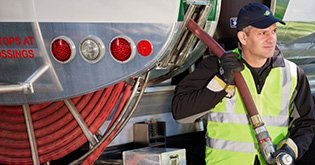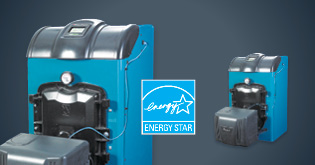Tankless water heaters vs Storage tank water heaters.
 Your home’s water heater is an integral piece
of equipment, required to keep every day functioning normally. But replacing a water heater is not cheap and you need to be smart about choosing whether a tankless storage tank water heating system is right for you, as the equipment should last
for over 10 years.
Your home’s water heater is an integral piece
of equipment, required to keep every day functioning normally. But replacing a water heater is not cheap and you need to be smart about choosing whether a tankless storage tank water heating system is right for you, as the equipment should last
for over 10 years.
To help you, we’re sharing the following comparison chart, detailing the pros and cons of tankless vs storage tank water heaters, to help you make the smartest decision.
Tankless (on-demand) water heaters. | Storage tank water heaters. |
How tankless systems work:- Water is heated quickly by high-powered burners as it travels through a heat exchanger, not stored in a tank.
- Water travels directly to the required location in your home without storing it in a tank.
- Normally powered by electricity or natural gas.
| How storage tank systems work:- An insulated tank, with an average capacity of 30-50 gallons of water is heated and stored until hot water is required.
- Hot water is delivered to the bathroom, kitchen, or other locations via a pipe that leads from the top of the tank to a piping system throughout the home.
- Storage tank systems feature a temperature and pressure-release valve that opens when temperature or pressure exceeds any preset level.
- Normally powered by natural gas or electricity.
- Natural gas-powered heaters use almost 50 percent less energy than those powered by electricity but are a little more expensive to purchase.
|
Pros and cons of tankless systems vs Storage tank systems. |
Pros:- Provide more potential to save money over time.
- Offer more potential for energy efficiency depending on your home’s water usage.
- Normally have a lifespan of 20 to 30 years, double that of storage tank water heaters. However, “hard water” can lower the lifespan of any water heater.
- Takes up much less space than a storage-tank water heater.
- Small, tankless systems are easier to install in smaller spaces/homes, even outside the home.
- Always ensures that you have hot water “on demand” with no waiting for water to heat up.
- Installing tankless water heaters at all hot water outlets, while initially costly, could save you up to 27%-50% in water heating energy costs.
| Pros: - Significant lower initial cost for purchase and installation compared to tankless systems.
- Easier to operate than tankless systems.
- Less costly maintenance, repair, and replacement costs.
|
Cons:- More expensive than storage tank water heaters.
- If replacing a storage-tank water heater with a tankless system, installation can be costly, with potentially extra plumbing costs of relocating piping and more.
- Output challenges can be a problem, especially if multiple showers or showers and laundry are being done simultaneously.
| Cons:- Utility bills can be a little higher than tankless systems because they constantly reheat the water in the tank to a preset temperature.
- Having a tank, take up more space and must be installed inside the home.
The tank runs low, which means it needs to refill and reheat the water in the tank. If there are a lot of showers taken in your house daily, it may
not be a very hot shower if you’re the last to do so. - Require replacement more often than tankless water heaters, with an average lifespan of 10-15 years.
|

As your local home service experts, you can rely on Meenan for the latest, energy-efficient tankless, and storage water heaters from all major brands. Our home service and plumbing professionals will help you make the best decision for your home, as well
as provide fast, reliable installation and repair services, too.
Call today! We’re to help you 24/7:
Long Island NY: 516.783.1000
Pennsylvania: 215.943.3500

 Your home’s water heater is an integral piece
of equipment, required to keep every day functioning normally. But replacing a water heater is not cheap and you need to be smart about choosing whether a tankless storage tank water heating system is right for you, as the equipment should last
for over 10 years.
Your home’s water heater is an integral piece
of equipment, required to keep every day functioning normally. But replacing a water heater is not cheap and you need to be smart about choosing whether a tankless storage tank water heating system is right for you, as the equipment should last
for over 10 years. 



.jpg?sfvrsn=59b4717f_1)
.jpg?sfvrsn=38eb02bb_5)